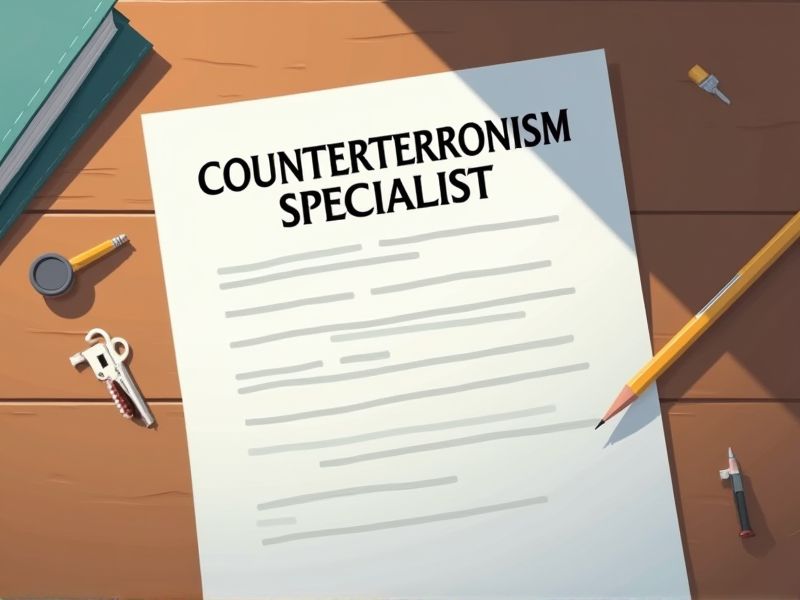
Counterterrorism specialists operate in high-stakes environments where precision and depth of knowledge are essential, necessitating specialized certifications. Certifications provide critical understanding of threat assessment, intelligence analysis, and risk management, equipping specialists to handle complex scenarios and rapidly evolving threats. Organizations prioritize candidates with recognized expertise and proven proficiency, streamlining operational efficiency and ensuring protective measures are effectively implemented. These are some key certifications that may be required for a role as a Counterterrorism Specialist.
Certified Counterterrorism Specialist (CCS)
A Certified Counterterrorism Specialist brings structured and accredited knowledge crucial for effectively identifying and mitigating terrorist threats. Possessing certification ensures that a specialist has undergone rigorous training, creating a standardized baseline of expertise across the field. The CCS status enhances credibility and trust among governmental and private sectors looking to engage skilled professionals in counterterrorism. As terrorism tactics evolve, certified individuals stay updated with the latest strategies and technologies, maintaining the relevance and effectiveness of counterterrorism efforts.
Certified Homeland Security Professional (CHSP)
Certified Homeland Security Professionals (CHSPs) bring structured knowledge crucial for understanding evolving terrorist threats, enabling effective counterterrorism strategies. Their certification ensures they possess the competencies necessary to assess risks and implement security measures to mitigate potential attacks. This specialized training enhances their ability to coordinate with multiple agencies, ensuring a cohesive response during emergencies. With verified skills in crisis management, CHSPs are indispensable in maintaining national security and public safety.
Certified Intelligence Analyst (CIA)
The complexity of modern terrorist threats requires the analytical skills of a Certified Intelligence Analyst (CIA) to interpret vast amounts of intelligence data. Because counterterrorism involves anticipating and dismantling potential plots, a CIA's expertise in recognizing patterns and assessing risks is instrumental. Terror networks often operate across borders, and CIAs are equipped to understand international datasets and integrate intelligence from multiple sources. Effective counterterrorism strategies depend on accurate threat assessments, which CIAs are trained to provide.
Certified Threat Intelligence Analyst (CTIA)
The increasing complexity of cyber threats necessitates a Certified Threat Intelligence Analyst (CTIA) to help counterterrorism specialists identify and understand potential digital risks. CTIA's proficiency in analyzing threat intelligence allows for better prediction and mitigation of attacks that could aid terrorism activities. When counterterrorism specialists work with CTIAs, they benefit from data-driven insights, enhancing their strategies in identifying terrorist activities online. This collaboration ensures a more comprehensive approach to preventing digital avenues from being exploited by terrorist organizations.
Certified Anti-Terrorism Specialist (CATS)
The role of Certified Anti-Terrorism Specialist (CATS) is needed because it ensures that counterterrorism specialists possess standardized expertise in identifying and mitigating terrorist threats. This certification provides specialists with in-depth knowledge of global terrorism trends, enhancing their strategic responses. CATS certification equips professionals with the ability to integrate security measures effectively, reducing the likelihood of terror incidents. It also validates a specialist's skills, leading to better collaboration with international and domestic agencies.
Certified Protective Security Advisor (CPSA)
The role of a Certified Protective Security Advisor (CPSA) enhances a Counterterrorism Specialist's ability to assess and mitigate risks by providing expertise in infrastructure protection and resilience. The CPSA's specialized training ensures that protective measures are not only implemented but are also compliant with national security standards. Their knowledge in emerging threats and security technologies equips counterterrorism teams to adapt effectively to evolving threat landscapes. The CPSA's collaboration with various government and private entities strengthens a coordinated response to potential terrorist activities.
Advanced Counterterrorism Certificate (ACTC)
The ever-evolving nature of global terrorism necessitates that Counterterrorism Specialists possess specialized, up-to-date knowledge on methods of detection and prevention, which the ACTC provides. Terrorist networks increasingly utilize sophisticated technologies, and the ACTC equips professionals with the skills to counteract these threats effectively. Obtaining the ACTC ensures that specialists are trained in strategic thinking and international law, critical for coordinating efforts in diverse geopolitical landscapes. The recognition and validation of expertise given by the ACTC can enhance a specialist's credibility and career prospects in a highly competitive field.
Global Terrorism Analysis Certification (GTAC)
A Global Terrorism Analysis Certification equips counterterrorism specialists with critical skills to identify evolving terrorist threats based on global patterns. Enhanced analytical capabilities enable specialists to make informed decisions, potentially reducing incidents and saving lives. Standardized knowledge from the certification ensures cohesive communication and strategy among international counterterrorism teams. Certified specialists can access a network of experts, fostering collaboration and sharing best practices across borders.
Cybersecurity and Counterterrorism Certificate (CCTC)
The evolving threat landscape necessitates a Cybersecurity and Counterterrorism Certificate as it equips specialists with advanced skills to counter complex cyberterrorism strategies. Integration of digital tools in terrorist activities has heightened the demand for professionals who can effectively mitigate cyber threats. Enhanced training through the CCTC empowers specialists with comprehensive knowledge of cyber vulnerabilities and response mechanisms. As government and private sectors increasingly face cyber threats, the CCTC ensures specialists are adept at protecting critical infrastructure and sensitive information.
Crisis Management and Emergency Response Certification (CMERC)
Crisis Management and Emergency Response Certification (CMERC) equips counterterrorism specialists with essential skills for quickly assessing and responding to threats, which reduces potential harm. In high-pressure situations, having standardized training ensures that specialists can communicate and coordinate effectively with other agencies and first responders. The certification provides a structured approach to incident management, enabling specialists to implement strategic interventions with confidence. As terrorism methods evolve, ongoing education through CMERC ensures that specialists remain updated with the latest strategies and technologies.
Summary
You, as a Counterterrorism Specialist, can expect enhanced skills and knowledge from obtaining relevant certifications. This advancement will likely boost your proficiency in identifying risks and implementing effective strategies. Certifications often lead to increased credibility and trust among peers and employers. The culmination of these factors generally results in greater career opportunities and potential for professional growth.
